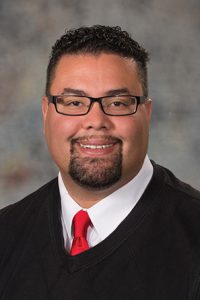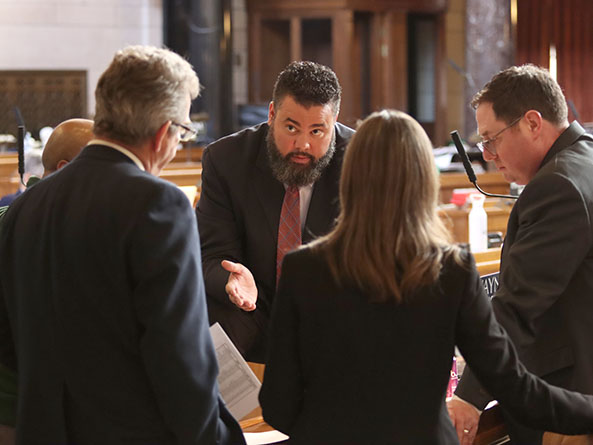North Omaha recovery bill expanded, advanced
A bill originally intended to focus on COVID-19 recovery efforts in North Omaha was broadened and advanced from select file March 31.

LB1024, as introduced by Omaha Sen. Justin Wayne, would have appropriated $450 million of the federal American Rescue Plan Act funds allocated to Nebraska to the North Omaha Recovery Act Fund. The funds would be used to provide grants to projects in qualified census tracts located within the boundaries of a metropolitan class city. Omaha is the state’s only metropolitan class city.
A federally qualified census tract is one in which 50 percent or more of households have an income less than 60 percent of the area median gross income or a poverty rate of at least 25 percent.
An amendment adopted during general file debate reduced the ARPA appropriation to $250 million and added a $225 million transfer from the state’s Cash Reserve Fund.
Wayne offered an amendment on select file, adopted 43-0, that replaced the bill and outlined a compromise to expand the proposal’s reach outside of the Omaha metro area. The amendment would lower the cash reserve transfer to $55 million and place it, along with $80 million of the ARPA funds, into the Economic Recovery Contingency Fund.
Wayne said those funds would be held in reserve for projects in Omaha that will be brought to the Legislature for consideration over the next two years, which he said would add an extra layer of accountability to the proposal.
A newly created Economic Recovery Special Committee of the Legislature would review proposals for distribution of those funds. The committee would include the chairpersons of the Appropriations and Urban Affairs committees, the speaker of the Legislature and four other senators who represent legislative districts containing one or more qualified census tracts located within a metropolitan class city.
The remaining $135 million would be distributed in fiscal year 2022-23. Up to $55 million would be available to provide grants through the newly created Qualified Census Tract Recovery Grant Program to provide funding to public and private entities located within qualified census tracts.
Up to $10 million of those funds would be available to projects in primary class cities — Lincoln is Nebraska’s only primary class city — and $10 million to areas outside of Lincoln and Omaha. No less than $35 million would go to qualified census tracts in North and South Omaha.
The grant program would be augmented by $30 million in state general funds over the next three fiscal years.
The amendment also would direct at least $60 million for development of an airport business park in Omaha, $30 million to innovation hubs located within two miles of the same airport and $20 million to prepare land parcels for affordable housing.
A total of $30 million would be available for affordable housing projects in Lincoln, as well as $5 million for a lost revenue program for the Lancaster County Event Center, $3 million in tourism development grants across the state and a few smaller projects.
The amendment also would remove a requirement that the approximately $126 million from the federal Coronavirus Capital Projects Fund allocated in the bill be used for projects in qualified census tracts. It instead would divide the funds roughly equally among Nebraska’s three congressional districts for multipurpose community facilities or broadband infrastructure project grants.
“We have broadened this to make sure that this bill reflects the entire state’s needs when it comes to some ARPA requirements but also with the emphasis still on North Omaha,” Wayne said.
Lincoln Sen. Anna Wishart supported the proposal. She said LB1024 would help North Omaha and other under-resourced areas of Nebraska.
“This bill is also criminal justice reform. This bill is economic development for an historically under-developed community in terms of resources from the state,” Wishart said.
Sen. Mike Hilgers of Lincoln also supported LB1024, calling it a thoughtful and strategic long-term plan. He noted Wayne’s willingness to scale back the bill’s use of cash reserve funds and work with senators outside of Omaha to find compromise.
“[Sen. Wayne] has gotten incredibly creative to find a number and a path that will make a difference for his community,” he said.
A second Wayne amendment, adopted 38-0, would allow public or private entities to accept grants from the Economic Recovery and Incentives Division for capital projects.
An amendment adopted on general file added provisions of Wayne’s LB915, which would stipulate that any nonprofit that has received middle-income workforce housing grant funds would not be eligible for additional grants unless they have spent at least 50 percent of previous grant funds.
Senators advanced LB1024 to final reading on a voice vote.


